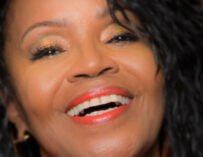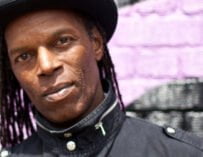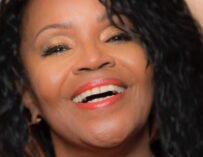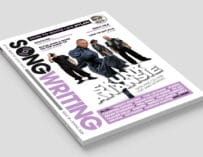
Ocean Colour Scene. Simon Fowler: “Like all pretentious young men, I got into William Burroughs and Jack Kerouac.” Photo: Brian Sweeney
The frontman reflects on the rise of the Birmingham band, their songwriting process, and the camaraderie that shaped their sound
For over three decades, Simon Fowler has been the unmistakable voice of Ocean Colour Scene, the band that soundtracked a generation with anthems like The Riverboat Song and The Day We Caught The Train. Formed in 1989, their rise was anything but instant – years of relentless gigging, lineup changes, and an industry indifferent to their debut album left them on the fringes of Britpop. But by the mid-90s, everything changed. Their second album, Moseley Shoals, catapulted them into the mainstream, earning multi-platinum success and securing their place as one of the era’s defining acts.
As Ocean Colour Scene prepare to hit the road again, Simon reflects on the band’s early days, their approach to writing, and the dynamic that kept them together…
With the band starting in ’89 and then bursting onto the scene in ’95, you could call it a six-year overnight success! Tell us a little bit about how you got together as a band and the dynamic from a songwriting perspective.
“Well, Oscar [Harrison], Damon [Michella] and myself were in a band called The Fanatics. Oscar was only in [the band] for a few months, and then we disbanded and Steve [Cradock] joined. I’d known Steve for about five or six years, I guess, probably longer – he was in other bands in our area, and we became drinking friends. His father, who became our manager, always urged Steve and me to get together, and so we did. Then when we formed, there was a record deal waiting for us from a bloke called John Mostyn who managed Fine Young Cannibals, Alison Moyet, The Beat… In the 80s, he was kind of Mr Birmingham, and he set up a label, so the deal was waiting for us.
“We started recording the first album with Jimmy Miller, who was the Rolling Stones producer from ’67 through to ’74, something like that. Basically, it didn’t really work out with him, so then it was re-recorded and, by the time it came out, we weren’t interested in it – by that time, everyone else was interested in Nirvana. So…we retreated to Birmingham, and that’s where we learnt to be a band. We would spend every day in the studio, and I’d spend every day, every night writing. Then I’d take my songs into the studio, and Steve or Damon might have some musical ideas, Oscar would come up with some piano or drum ideas… I mean, The Riverboat Song was very much the four of us, but I tended to write most of the songs, to be quite honest.”
Almost all the songs on those first few albums were credited to Ocean Colour Scene, collectively. Was that a conscious decision?
“It was. It was my decision. I’ve always thought that one of the main reasons bands split up is because they end up with the ludicrous position where [someone] writes the songs and ends up a lot richer than the others. Sometimes I do wish I hadn’t been so nice!
“A song I wrote on my own, which was another big song of ours at the time, was The Day I Caught The Train… [But] it’s like being in a gang. I mean, that’s one of the reasons [to start a band]. I could have very easily just thought, ‘I’m going to be Neil Young, I’m going to be a solo artist,’ but I just loved being in a gang.”
Simon, tell us what influenced your lyric writing.
“From a very early age, like all pretentious young men, I got into William Burroughs and Jack Kerouac and the cut-up techniques of Brion Gysin – I took that very much on board and [it became] a major influence, lyrically. And everything else would be Bob Dylan. I mean, if you listen to a song like Sad Eyed Lady Of The Lowlands, or anything around that great ’65 -66 period. I mean, he got away with murder. I was reading an interview with John Lennon, and he [admitted] he got away with murder. Sitting on a cornflake? Climbing up the Eiffel Tower? I mean, he was always very much into Edward Lear, you know?”
“But, sometimes he can overplay his hand. I mean, I remember getting a book by [Dylan] called Tarantula, right? I’m not having it! Everyone says Dylan is a unique character, but, my God, he’s ripped off a lot of people! His early persona… It’s pretty much [French poet Arthur] Rimbaud’s Illuminations. He said that he was very influenced by the Illuminations.”

Ocean Colour Scene’s Simon Fowler: “I still can’t play The Riverboat Song!” Photo: Jim Mitcham
Some would argue that no art is entirely original – it’s all an interpretation of what’s come before it.
“Well, yeah. Because if you weren’t inspired, you wouldn’t be sitting down with an acoustic guitar and singing Woody Guthrie songs, would you? And then they morph into yours. Same with me and the Beatles, David Bowie, Lou Reed, Neil Young, in particular… I wouldn’t be doing what I do now if I hadn’t grown up on the Beatles and Simon & Garfunkel… Like, why would a DJ become a DJ if they didn’t grow up listening to Radio One?”
Speaking of acoustic guitar, you’re doing an acoustic tour with Oscar later this year.
“I can write a song on acoustic guitar, and I can play the acoustic guitar up to a reasonable level to play live. But I still can’t play The Riverboat Song!”
Tell us more about how your songwriting may have developed or changed after you’d had the success of Moseley Shoals and Marching Already. How did you handle the creative pressure that would have been on you at that point?
“I think we just carried on in the same way. There was never really a plan. We just used to get together every day in the studio. What did happen is that, in ’97 or ’98, I moved out to a place about 20 miles from Birmingham, so I used to drive in and drive back. So it wasn’t the case of getting wrecked every day at the studio like we used to do and walking home or to the pub. And I think a certain element of cohesiveness was possibly lost then.
“Shortly after that, the studio was purchased by the council – it’s now apartments – and that was the end of the impetus, I think. Then we went and recorded an album in the glens of Scotland, then we did another album Wales, and it wasn’t the same. Basically, the real essence of this band was: we were living in each other’s pockets, every single day. And if we weren’t recording, we were playing or doing TV shows, or doing radio stuff abroad – our feet didn’t touch the ground. It was all great fun. We had a terribly fun time! It was all very cohesive.”
Like a gang, as you said.
“Absolutely. Then there was a fallout, and Damon left the band. I’ve always regretted that that happened, but it was the right thing to do at the time. He’s done well for himself. Damon, he’s doing okay… He’s a brilliant bass player. I remember our current bass player, Ray [Meade]; he’s been with us for more than 10 years, and Damon saw us last year. He was standing on the side of the stage, and afterwards, Ray came up to me and said, ‘I was absolutely petrified,’ because he said how difficult it was to learn Damon parts. He said the nicest thing was that Damon went up to him and said, ‘You did really, really well.’ He was absolutely over the moon.”
To finish off, Simon, we’re having this conversation the week of World Book Day, so is there a songwriting-related book which you can recommend?
“Yes, it’s my book! It’s a book of interviews I did with one of my oldest friends, Daniel Rachel, about two years ago. I’ve known Daniel since he was five, and he’s a hoarder of Ocean Colour Scene and my previous band stuff – he’s hoarded it all his life. So he’s got memorabilia that nobody else in the world would have, and it was put together in a beautiful coffee table book called One For The Road. If you want to know anything about my life, the band and all the misadventures that we got up to…it’s all in there. Not for the faint-hearted, but it’s all true!”



































Related Articles